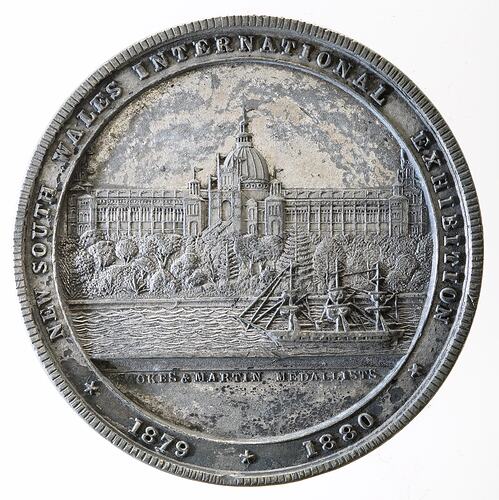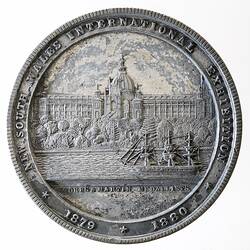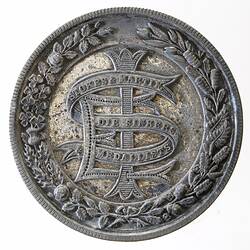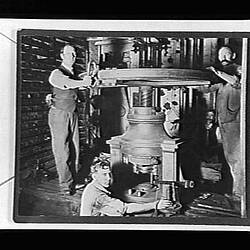Summary
Australia New South Wales Sydney
Medal - Sydney International Exhibition 1879 Commemorative
First International Exhibition
Mint: Stokes & Martin
Other Details: A 47 mm diameter commemorative medal struck by the Melbourne firm Stokes & Martin to commemorate the 1879 Exhibition. It features a view of the Sydney Garden Palace from across the Harbour, with a sailing ship at anchor in the foreground. The Sydney International Exhibition was the first true international exhibition that an Australian colony had hosted. Previous exhibitions had been local or intercolonial. The International Exhibition was held in a purpose-built building at Inner Domain, featuring 15 acres of display area and a main dome 210 feet high. Four towers of this 'Garden Palace' provided spectacular views of the city and harbour, and the galleries were illuminated with stained glass skylights. The Exhibition was opened by His Excellency Lord Augustus Loftus on 17 September 1879, whose arrival in Sydney from England the previous month as the new Governor of New South Wales had been received with great enthusiasm. The Exhibition attracted over 1.1 million visitors, at a time when the population of New South Wales was 739,385. Awards for exhibitors were announced by the judges on the closing day, 20 April 1880. Gold, large silver, small silver and bronze medals and diplomas were awarded. The medal's obverse was based on a design by Samuel Begg and subsequently altered by J.S. and A.B. Wyon, who prepared the dies. The wreath of Australian flowers on the reverse was designed by James W. Sayers. The gold and silver medals were struck at the Sydney branch of the Royal Mint, and the bronze medals were struck in London. About 7,554 awards were made. The exhibition was so popular that the government purchased many of the prize exhibits and set up the Technological, Industrial and Sanitary Museum, the grandparent of the Powerhouse Museum. The Garden Palace burned down in 1882.
Physical Description
A 47 mm diameter white metal commemorative medal struck by the Melbourne firm Stokes & Martin to commemorate the 1879 Exhibition. It features a view of the Sydney Garden Palace from across the Harbour, with a sailing ship at anchor in the foreground.
Obverse Description
View of the Garden Palace across the harbour and park, with sailing ship at anchor in foreground right, around on broad rim, * NEW SOUTH WALES INTERNATIONAL EXHIBITION * 1879 * 1880; in Exergue; STOKES & MARTIN MEDALLISTS
Reverse Description
Wreath around a monogram SIE; on the S of the monogram: STOKES & MARTIN / DIE SINKERS / MEDALLISTS
Edge Description
Plain
Significance
The Sydney International Exhibition was the first true international exhibition that an Australian colony had hosted. Previous exhibitions had been local or intercolonial. The International Exhibition was held in a purpose-built building at Inner Domain, featuring 15 acres of display area and a main dome 210 feet high. Four towers of this 'Garden Palace' provided spectacular views of the city and harbour, and the galleries were illuminated with stained glass skylights. The Exhibition was opened by His Excellency Lord Augustus Loftus on 17 September 1879, whose arrival in Sydney from England the previous month as the new Governor of New South Wales had been received with great enthusiasm. The Exhibition attracted over 1.1 million visitors, at a time when the population of New South Wales was 739,385. Awards for exhibitors were announced by the judges on the closing day, 20 April 1880. Gold, large silver, small silver and bronze medals and diplomas were awarded. The medal's obverse was based on a design by Samuel Begg and subsequently altered by J.S. and A.B. Wyon, who prepared the dies. The wreath of Australian flowers on the reverse was designed by James W. Sayers. The gold and silver medals were struck at the Sydney branch of the Royal Mint, and the bronze medals were struck in London. About 7,554 awards were made. The Garden Palace burned down in 1882. - Carlisle, Leslie J. 1978. Australia's First International Exhibition: Sydney 1879. Report of the Australian Numismatic Society. Yearbook No.3; Australian Dictionary of Biography. -D. Tout-Smith 11/11/2003.
The Sydney International Exhibition of 1879 included an extensive display of the handiwork of the children of NSW. This Sydney Juvenile Industrial Exhibition was organised by the Council of Education, with the schools of the colony contributing numerous exhibits, principally of crayon drawings, maps, illuminations and needlework. In all, the children won some six hundred awards, 'bearing testimony to the general merit of their handiwork' (from 'Official Record of the Sydney International Exhibition', 1881). -Powerhouse Museum web site http://www.phm.gov.au/scripts/webdbs/opac.idc?id=441. -D. Tout-Smith 20/10/2003.
More Information
-
Collecting Areas
-
Acquisition Information
Transfer from Melbourne Branch of Royal Mint, 11 Jan 1978
-
Date Issued
1879-1880 AD
-
Issued By
Stokes & Martin, 100 Collins Street East, Melbourne, Greater Melbourne, Victoria, Australia, 1879-1880
-
Mint
Stokes & Martin (Mint), Melbourne, Greater Melbourne, Victoria, Australia, 1879
-
Inscriptions
Plain (edge) *NEW SOUTH WALES INTERNATIONAL EXHIBITION * 1879 * 1880 View of the Garden Palace, Ship. In Exergue; STOKES & MARTIN MEDALLISTS (obverse) Wreath around a monogram SIE; on the letter S, STOKES & MARTIN / DIE SINKERS / MEDALLISTS (reverse)
-
Series
-
Material
White metal
-
Axis
12
-
Classification
-
Category
-
Discipline
-
Type of item
-
Dimensions
47 mm (Outside Diameter), 43.36 g (Weight)
-
Shape
Round
-
References
Car. 1879-80/8
[Article] Carlisle, Leslie J. 1978. Australia's First International Exhibition: Sydney 1879. Report of the Australian Numismatic Society. Yearbook No.3: 22-31.
[Book] Proudfoot, Peter, et al. 2000. Colonial City, Global City: Sydney's International Exhibition 1879.
[Book] 1881. Official Record of the Sydney International Exhibition, 1879. 1154.
-
Keywords



